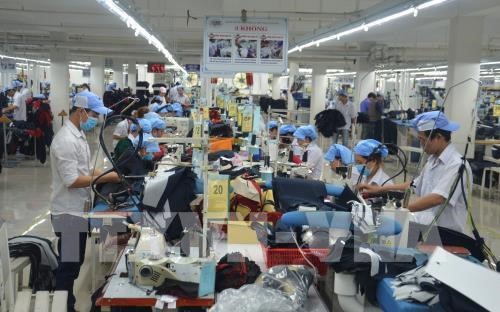 Society
Society

Industry 4.0 poses a challenge to the Vietnamese labour force so significant that the only way to meet it is to impose reforms across the board, starting with education and training programmes, experts agreed at a seminar yesterday in Hà Nội.
 |
| According to the International Labor Organization (ILO), for example, 86 per cent of workers in Việt Nam’s textile and footwear industries are at great risk of losing their jobs under the influence of technological breakthroughs caused by Industry 4.0. — VNA/VNS Photo |
HÀ NỘI – Industry 4.0 poses a challenge to the Vietnamese labour force so significant that the only way to meet it is to impose reforms across the board, starting with education and training programmes, experts agreed at a seminar yesterday in Hà Nội.
Titled The 4th Industrial Revolution and the impact on the labor market in Việt Nam, the seminar drew economists and other experts, all of whom agreed that the country will struggle to adapt to Industry 4.0—the wave of rapid technological development transforming workforces and economies across the world.
According to the International Labor Organization (ILO), for example, 86 per cent of workers in Việt Nam’s textile and footwear industries are at great risk of losing their jobs under the influence of technological breakthroughs caused by Industry 4.0.
“Industry 4.0 will leave no place for farming workers. The youth unemployment rate will be higher. The shortage of skilled workers as Industry 4.0 comes will also be very high,” Phạm Quang Ngọc, an economist and labour market expert, said at the seminar.
“If we don’t have creativity, technological application will be very low. The weak competition will lead to no growth,” said Ngọc.
According to the World Economic Forum (WEF)’s Readiness for the Future of Production Report 2018, among the 100 countries assessed, Việt Nam was ranked among those that aren’t ready for Industry 4.0.
Dr. Lê Anh Vinh from the Vietnam Institute of Educational Sciences at the Ministry of Education and Training said the young generation needed to be prepared for major changes to the country’s workforce.
More than half of Việt Nam’s workforce is under the age of 40, with the proportion of workers aged 15-29 at 25 per cent.
Not only lacking in professional knowledge, Vietnamese workers are weak in problem solving, leadership and communication skills. The advantage of low labour costs in Việt Nam is gradually losing attractiveness in the eyes of foreign investors.
Enterprises surveyed by domestic and foreign organizations for a number of research projects said they were dissatisfied with the quality of education and skills of staff, especially engineers and technicians.
At the seminar, experts mapped out solutions.
Training institutions need to adopt learner-centered training methods and the application of information technology in lecture design and delivery.
Innovation of form and method of examination are needed to develop work capability and creativity among learners.
Institutions should pay more attention to the development of the automation industry, as well as invest in in-depth research teams in the fields of information technology, energy and new materials and biotechnology.
The State focuses on forecasting human resource needs according to the structure of the industry and training level. On that basis, the State has made timely adjustments in terms of training, meeting the requirements of socio-economic development in each period and intensifying multilateral and bilateral cooperation in the field of education and training.
The State shall train and foster teachers and school administrators and create favourable legal and social conditions for foreign investors to open high-quality educational institutions in Việt Nam.
Enterprises need to deploy robots to automate and apply technology solutions to improve productivity.
The seminar was jointly organized by Việt Nam Omega Books Joint Stock Co, Việt Nam Chamber of Commerce and Industry’s Office of Employers and the Centre for International Studies at University of Social Sciences and Humanities under Vietnam National University HCM City. -- VNS